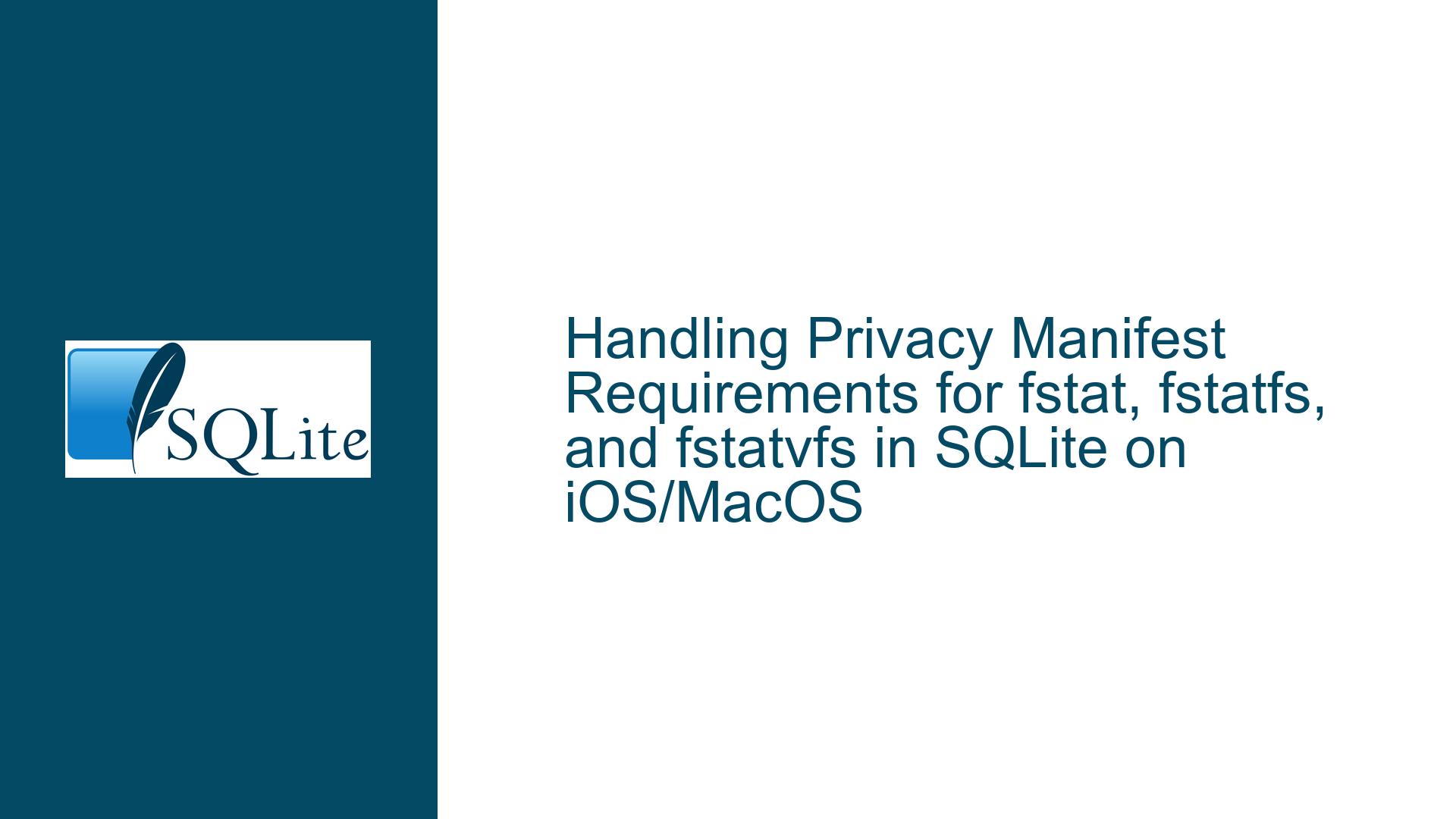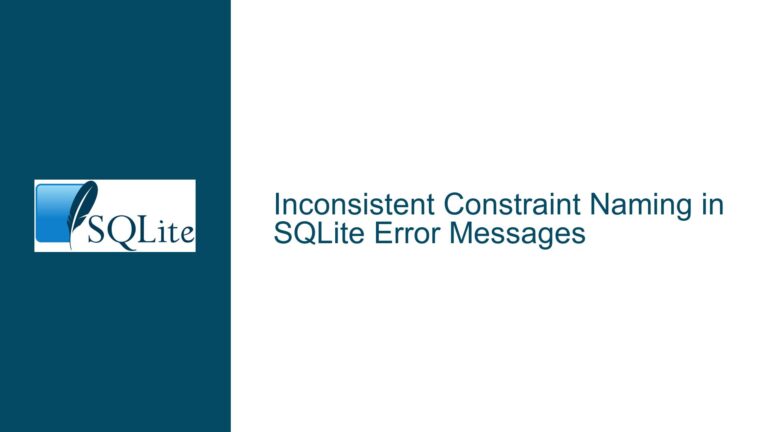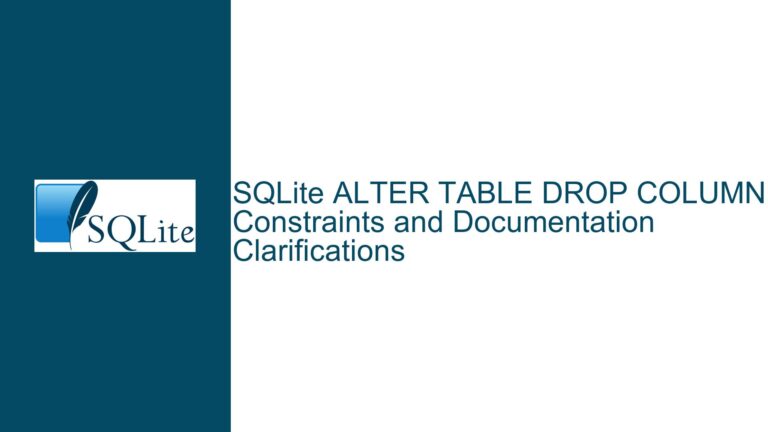Handling Privacy Manifest Requirements for fstat, fstatfs, and fstatvfs in SQLite on iOS/MacOS
Understanding the Privacy Manifest Requirements for File and Disk Space APIs
The introduction of new privacy requirements in Xcode 15 and iOS 17 has brought significant changes to how developers can use certain APIs that might be leveraged for fingerprinting or collecting user data. Among these APIs are fstat, fstatfs, and fstatvfs, which are commonly used in SQLite for file and disk space operations. These APIs now require developers to declare specific reasons for their usage in a Privacy Manifest file (xcprivacy). Failure to comply with these requirements can result in app rejection during the App Store review process.
The Privacy Manifest documentation outlines several allowed reasons for using these APIs, categorized under two main groups: File Timestamp APIs and Disk Space APIs. For file timestamp APIs, the allowed reasons include displaying file timestamps to the user (DDA9.1), accessing timestamps within the app’s container (C617.1), and accessing timestamps for files or directories the user has explicitly granted access to (3B52.1). For disk space APIs, the allowed reasons include displaying disk space information to the user (85F4.1) and checking disk space to manage file operations (E174.1).
In the context of SQLite, these APIs are often used for low-level file system operations, such as checking file metadata, managing write-ahead logs, and handling disk space constraints. For example, fstat is used to retrieve file status information, including timestamps and file size, while fstatfs and fstatvfs are used to gather information about the file system, such as available disk space and file system type. These operations are critical for ensuring the reliability and performance of SQLite databases, particularly in resource-constrained environments like mobile devices.
However, the new privacy requirements impose restrictions on how this information can be used. Specifically, any data retrieved using these APIs, or any derived information, must not be sent off-device. This means that developers must carefully consider the purpose of their API usage and ensure that their implementation aligns with the allowed reasons specified in the Privacy Manifest.
Identifying the Root Causes of Privacy Manifest Compliance Issues
The core issue arises from the fact that SQLite, particularly older versions like 3.8.10.2, relies heavily on low-level file system APIs like fstat, fstatfs, and fstatvfs for various operations. These APIs are deeply embedded in the SQLite codebase, making it challenging to modify or replace them without significant effort. Additionally, the specific use cases for these APIs in SQLite may not always align neatly with the allowed reasons specified in the Privacy Manifest, leading to potential compliance issues.
One of the primary challenges is determining the appropriate reason for using these APIs in the context of SQLite. For example, fstat is used to retrieve file metadata, including timestamps, which are essential for tasks like database recovery, transaction management, and file integrity checks. However, the allowed reasons for using file timestamp APIs are primarily focused on displaying timestamps to the user or accessing timestamps within the app’s container. This creates a mismatch between the technical requirements of SQLite and the privacy requirements imposed by Apple.
Another issue is the use of fstatfs and fstatvfs for disk space management. These APIs are used to check available disk space and file system properties, which are critical for ensuring that SQLite can perform write operations without running out of space. However, the allowed reasons for using disk space APIs are limited to displaying disk space information to the user or managing file operations based on disk space constraints. This again creates a potential compliance issue, as the use of these APIs in SQLite may not always fit within these narrow categories.
Furthermore, the use of these APIs in SQLite is often tied to platform-specific workarounds or optimizations. For example, fstatfs is used in SQLite to address a bug in macOS related to incorrect inode numbers for zero-size files. While this use case is technically valid, it may not align with the allowed reasons specified in the Privacy Manifest, leading to potential compliance issues.
Resolving Privacy Manifest Compliance Issues in SQLite
To address these compliance issues, developers have several options, each with its own trade-offs and considerations. The most straightforward approach is to update the Privacy Manifest file to declare the appropriate reasons for using the affected APIs. This requires a thorough understanding of the specific use cases for these APIs in SQLite and how they align with the allowed reasons specified in the Privacy Manifest.
For file timestamp APIs like fstat, developers should carefully review the use cases in their application and determine whether they fall under one of the allowed reasons. For example, if fstat is used to retrieve file timestamps for database recovery or transaction management, this may not align with the allowed reasons, which are focused on displaying timestamps to the user. In such cases, developers may need to refactor their code to minimize the use of these APIs or find alternative approaches that comply with the privacy requirements.
For disk space APIs like fstatfs and fstatvfs, developers should similarly review the use cases and determine whether they align with the allowed reasons. If these APIs are used to check disk space for managing file operations, this may fall under the allowed reason E174.1, which permits checking disk space to ensure sufficient space for writing files. However, if these APIs are used for other purposes, such as gathering file system information for optimization or debugging, this may not comply with the privacy requirements.
Another approach is to leverage the built-in SQLite library provided by iOS and macOS, as suggested by Richard Hipp. This library is optimized for the platform and includes fixes for many bugs and performance issues present in older versions of SQLite. By linking against the built-in library, developers can avoid the need to use low-level file system APIs directly, thereby reducing the risk of privacy compliance issues. However, this approach may not be feasible for all applications, particularly those that rely on custom modifications or extensions to SQLite.
In cases where updating the Privacy Manifest or linking against the built-in library is not feasible, developers may need to consider alternative strategies, such as refactoring their code to minimize the use of these APIs or implementing custom solutions that comply with the privacy requirements. For example, developers could replace fstat with higher-level APIs that provide the necessary file metadata without requiring direct access to low-level file system information. Similarly, developers could implement custom disk space management logic that avoids the use of fstatfs and fstatvfs.
Ultimately, resolving privacy manifest compliance issues in SQLite requires a combination of careful analysis, code refactoring, and platform-specific optimizations. By understanding the specific use cases for these APIs and how they align with the privacy requirements, developers can ensure that their applications comply with the latest privacy standards while maintaining the reliability and performance of their SQLite databases.
In conclusion, the new privacy requirements introduced in Xcode 15 and iOS 17 present significant challenges for developers using SQLite, particularly those relying on low-level file system APIs like fstat, fstatfs, and fstatvfs. By carefully analyzing the use cases for these APIs, updating the Privacy Manifest file, and leveraging platform-specific optimizations, developers can ensure compliance with the privacy requirements while maintaining the functionality and performance of their applications.






